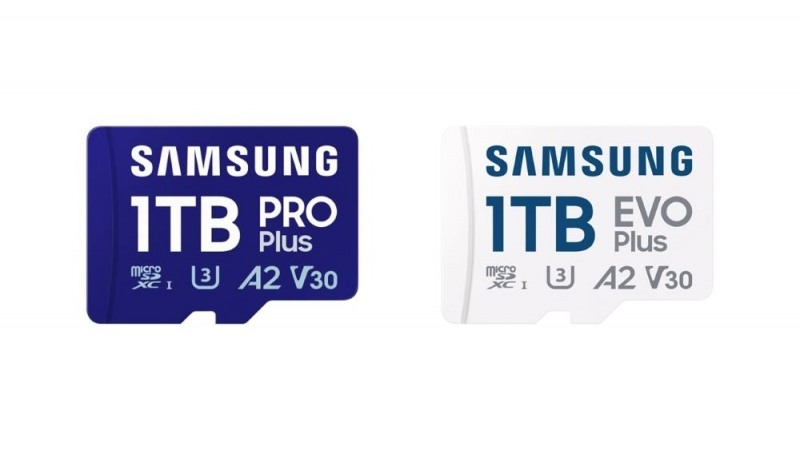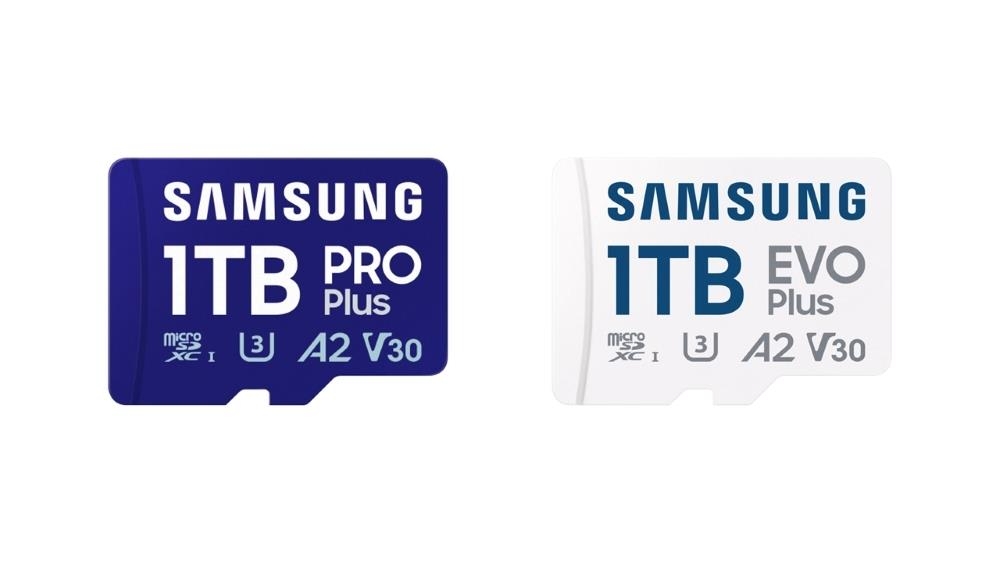The products feature the industry's highest capacity 1Tb Triple Level Cell (TLC) generation V-Fund, which can record 3-bit data in a single cell, stacked in eight layers to realize terabyte-class high capacity and enhance product durability.
First introduced in 2015, the PRO Plus and EVO Plus lineup are microSD cards that combine high capacity, speed, reliability, and compatibility. They are the optimal solution for users who require high performance and high capacity, and are compatible with any device with a microSD card slot, including game consoles, drones, action cams, tablets, and more, making them ideal for creators, gamers, and other users.
With this new release, both the PRO Plus and EVO Plus have doubled their maximum capacity from 512GB (gigabytes) to 1TB, and both offer sustained read speeds of up to 180MB (megabytes) and 160MB per second, respectively.
The 1TB capacity can store more than 400,000 2.3MB 4K UHD resolution images or 45 20GB console games, making it ideal for creators, console game players, and others who work with large files.
The Pro Plus and Evo Plus 1TB feature a 28-nanometer controller for improved power efficiency to reduce battery consumption, and the size of the LDPC, a type of error correction code (ECC) engine, has been increased from 1KB to 2KB to minimize data loss and increase product reliability.
In addition, the UHS Speed Class 3 (U3), Video Speed Class 30 (V30), and A2 ratings support fast data loading and multitasking, and the product has been verified for six categories, including water resistance, heat resistance, X-ray, magnetic field, drop, and abrasion, to ensure reliable data protection even in extreme external environments.
“As consumers increasingly use mobile devices, there is a growing need for high-performance products that can handle large amounts of data,” said Han-Koo Son, Managing Director and Head of Branded Product Business Team, Memory Business Division, Samsung Electronics. ”The Pro Plus and Evo Plus 1TB are the perfect solution for consumers who want to reliably store large amounts of data.”
Kim JaeHun (rlqm93@fntimes.com)































![[DQN] BNK금융, 비이자 성장 돋보였지만 지속성 고민…JB, 충당금에 ‘발목’](https://cfnimage.commutil.kr/phpwas/restmb_setimgmake.php?pp=006&w=69&h=45&m=5&simg=2026011913504200298b4a7c6999c121131189150.jpg&nmt=18)


![[DCM] CJ제일제당·삼양사·대한제당, 가격담합으로 부풀려진 신용등급](https://cfnimage.commutil.kr/phpwas/restmb_setimgmake.php?pp=006&w=69&h=45&m=5&simg=2026022013425808632a837df6494123820583.jpg&nmt=18)
![토스증권, 해외주식 신흥강자로 영업익 업계 9위 '우뚝' [금융사 2025 실적]](https://cfnimage.commutil.kr/phpwas/restmb_setimgmake.php?pp=006&w=69&h=45&m=5&simg=2026022015114702246179ad4390712813480118.jpg&nmt=18)













![[그래픽 뉴스] 워킹맘이 바꾼 금융생활](https://cfnimage.commutil.kr/phpwas/restmb_setimgmake.php?pp=006&w=298&h=298&m=1&simg=202602021638156443de68fcbb3512411124362_0.jpg&nmt=18)
![[그래픽 뉴스] 매파·비둘기부터 올빼미·오리까지, 통화정책 성향 읽는 법](https://cfnimage.commutil.kr/phpwas/restmb_setimgmake.php?pp=006&w=298&h=298&m=1&simg=202601281456119025de68fcbb3512411124362_0.jpg&nmt=18)
![[그래픽 뉴스] 하이퍼 인플레이션, 왜 월급이 종잇조각이 될까?](https://cfnimage.commutil.kr/phpwas/restmb_setimgmake.php?pp=006&w=298&h=298&m=1&simg=202601141153149784de68fcbb3512411124362_0.jpg&nmt=18)
![[그래픽 뉴스] 주식·채권·코인까지 다 오른다, 에브리싱 랠리란 무엇일까?](https://cfnimage.commutil.kr/phpwas/restmb_setimgmake.php?pp=006&w=298&h=298&m=1&simg=202601071630263763de68fcbb3512411124362_0.jpg&nmt=18)
![[그래픽 뉴스] “이거 모르고 지나치면 손해입니다… 2025 연말정산 핵심 정리”](https://cfnimage.commutil.kr/phpwas/restmb_setimgmake.php?pp=006&w=298&h=298&m=1&simg=202601061649137526de68fcbb3512411124362_0.jpg&nmt=18)
![[신간] 고수의 M&A 바이블](https://cfnimage.commutil.kr/phpwas/restmb_setimgmake.php?pp=006&w=81&h=123&m=5&simg=2025091008414900330f8caa4a5ce12411124362.jpg&nmt=18)
![[신간] 리빌딩 코리아 - 피크 코리아 극복을 위한 생산성 주도 성장 전략](https://cfnimage.commutil.kr/phpwas/restmb_setimgmake.php?pp=006&w=81&h=123&m=5&simg=2025032814555807705f8caa4a5ce12411124362.jpg&nmt=18)
![[서평] 추세 매매의 대가들...추세추종 투자전략의 대가 14인 인터뷰](https://cfnimage.commutil.kr/phpwas/restmb_setimgmake.php?pp=006&w=81&h=123&m=5&simg=2023102410444004986c1c16452b0175114235199.jpg&nmt=18)


![[신간] 이게 화낼 일인가?](https://cfnimage.commutil.kr/phpwas/restmb_setimgmake.php?pp=006&w=81&h=123&m=5&simg=2026010610254801367f8caa4a5ce12411124362.jpg&nmt=18)

![[AD] 현대차, 글로벌 안전평가 최고등급 달성 기념 EV 특별 프로모션](https://cfnimage.commutil.kr/phpwas/restmb_setimgmake.php?pp=006&w=89&h=45&m=1&simg=20260106160647050337492587736121125197123.jpg&nmt=18)
![[AD] 현대차 ‘모베드’, CES 2026 로보틱스 부문 최고혁신상 수상](https://cfnimage.commutil.kr/phpwas/restmb_setimgmake.php?pp=006&w=89&h=45&m=1&simg=20260105103413003717492587736121125197123.jpg&nmt=18)
![[AD] 기아 ‘PV5’, 최대 적재중량 1회 충전 693km 주행 기네스 신기록](https://cfnimage.commutil.kr/phpwas/restmb_setimgmake.php?pp=006&w=89&h=45&m=1&simg=20251105115215067287492587736121125197123.jpg&nmt=18)
![[카드뉴스] KT&G, 제조 부문 명장 선발, 기술 리더 중심 본원적 경쟁력 강화](https://cfnimage.commutil.kr/phpwas/restmb_setimgmake.php?pp=006&w=89&h=45&m=1&simg=202509241142445913de68fcbb3512411124362_0.png&nmt=18)
![[AD]‘황금연휴에 즐기세요’ 기아, ‘미리 추석 페스타’ 이벤트 실시](https://cfnimage.commutil.kr/phpwas/restmb_setimgmake.php?pp=006&w=89&h=45&m=1&simg=20250903093618029117492587736121166140186.jpg&nmt=18)



